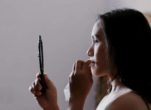
A Vulnerable Leap into Connection
I was sexually assaulted the summer before I went to college. The first person I ever told blamed me—and over time, that blame grew into shame. I sat in shame—and wanted to do nothing more than hide. I felt broken, I felt lonely, and I felt disconnected from myself and others…especially whenever I’d experience a flashback or panic attack, or when I would dissociate.
I’ve now come to learn those are all symptoms of PTSD, but at the time, I felt like I was broken beyond repair. I felt lonely because no one talked about sexual assault six years ago.
I felt disconnected from myself because every day was a struggle to get out of bed and face the world—a feeling that felt unfamiliar to my historically optimistic self. I felt disconnected from others because I felt like no one actually knew what was going on; they just saw the mask of happiness that I wore.
I felt scared that if people saw or heard my story, they’d reject me. It sounds silly to say now…but shame feeds the ideas that you’re broken, alone, and not worthy of connection. And silence feeds shame.
Two years later, I found myself sitting in a therapist’s room my sophomore year of college, and for the first time ever, someone told me, “You know…being sexually assaulted wasn’t your fault.” I just nodded and stared back at her. I went for a run to the ocean to process what had just happened…and as I sat, looking out at the water, I felt a shift. “Maybe it wasn’t my fault?” I asked myself.
It was the first step to becoming whole again and reconnecting with myself, as well as the world around me. My healing included long runs, journaling, lots of doodling, and spending time outdoors backpacking. Over time, shame dissipated, and by the end of my senior year in college, I felt like I owned my story and it no longer owned me. It wasn’t my fault—it was his fault.
Our campus was abuzz with conversations about sexual assault my senior year of college because a sexual predator was trolling our campus. I had a lot that I wanted to say, but felt voiceless because many people didn’t know that I was a survivor. So I decided to write an op-ed for our college newspaper.
Writing the article felt like the biggest leap of vulnerability. I was taking off the mask that I’d comfortably worn all four years of college and sharing my story that was authentic, messy, imperfect. I could hear shame whispering in my ear: “Don’t tell anyone…they’ll think you’re broken…” But it was a risk I was willing to take because I was tired of wearing a mask and feeling voiceless.
The article went live and I sat nervously in a college lecture…then, I got a ping. It was an email from a woman on campus whom I didn’t know, yet she thanked me for my article and told me she’d also been assaulted before but had never told anyone.
Her words struck me to my core and I started crying—tears of sadness, joy, and connection. I’d never personally known someone who’d been sexually assaulted—and within an instant, I felt less lonely. By the end of the day, my inbox was filled with messages. That day changed my outlook on life forever.
I realized that we all have parts of ourselves that we hide or things we want to share but don’t. However, we do a disservice not only to others but to ourselves when we hide and stay quiet. To be seen and heard just as we are is a risk, but it lets us get one step closer to what we all want in life: to feel connected to others. This realization is now the passion that fuels my business.
I graduated college a few months later and went on to become a wilderness therapy guide—taking at-risk kids backpacking. I left for a 50-day wilderness training program, and it was no surprise that I ended up bringing along a huge stack of copies of quote cards that I’d doodled over the years.
We ended up reading one of my quote cards before every dinner on that trip, and we’d discuss the quote under the stars—conversations of grief, self-love, body image, and other topics that I’d never really openly talked about with others.
Our 50-day trip ended with a 3-day solo where I sat alone in the woods with only a tarp, sleeping bag, water bottle, and my stack of quote cards—and I was struck with an idea to write a question on the back of each quote: ”How do you compare yourself to others?” or “What one moment forever changed your life?” or “Where do you find joy in life?” Every single question invited vulnerability.
So many of our conversations in life aren’t based on connecting. We talk about work, TV shows, sports…and of course, the weather. We miss out on conversations that allow our hearts can connect, because we’re not invited into a space where we can openly share our hopes, fears, experiences, or anything else that falls outside of small talk.
I decided to take my dusty, dirt-covered quote cards with questions and turn them into a game all about creating connections. With a lot of fundraising, brainstorming, and sheer determination, I’ve created a game of 365 cards that spark connection-fueled conversations.
Ironically, I’d just finished a year-long process of creating this game…and was personally feeling disconnected and lonely living in Colorado. I’d tried swiping on dating apps and joining a soccer ball team and even a book club.
Then, it clicked—I had a game that would allow me to connect with others! So I posted an online invitation for people to come to a bar for meaningful conversations.
Two guys and a coworker came, and we talked for three hours about masculinity, self-care, and confidence. By the end of the evening, a guy asked, “When’s the next one?” I laughed and said, “Next week.”
Since then, I’ve hosted 40+ events in Colorado and Washington, with 20 to 40 people flocking to each event. I love seeing people take off their masks and allow their stories to take up space. People talk about their big dreams, pending divorces, hopes in moving to a new city, breakups, business aspirations, losing a loved one, family dynamics, or anything else that’s on their mind and in their heart.
I didn’t mean to become a 25-year-old entrepreneur. I was just a girl who felt broken, lonely, and disconnected as I was dealing with the aftermath of sexual assault. And I was able to regain a sense a purpose through a leap of vulnerability that opened the door to connection.
My goal is to grow 365 Meaningful Conversations into the next bestselling game, as well as a nation-wide app for others to find local people to connect with through conversations—because I believe no one should feel lonely and that you’re only one conversation away from connection.










1 comment to "A Vulnerable Leap into Connection"